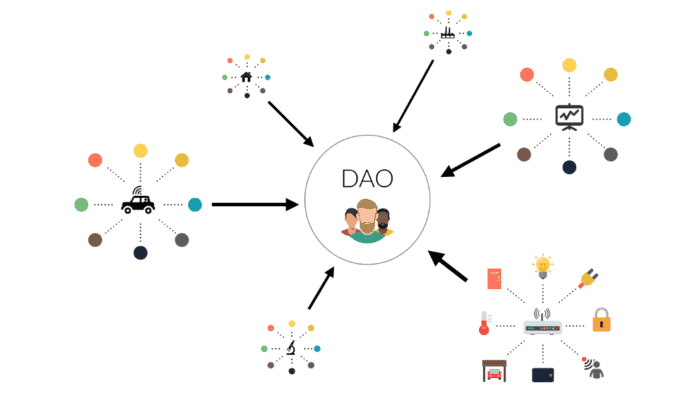What is a DAO?
A DAO (Decentralized Autonomous Organization) is a complex smart contract, where the rules of the decentralized organization are integrated into the code of the smart contract via a complex token governance.
The first true autonomous corporation is considered to be the Bitcoin network because it was coordinated solely through a distributed consensus protocol, which anybody could use. A DAO represents a complex stack of technologies and human-machine systems that are implemented in order to create a working autonomous infrastructure.
At today’s evolutionary rate, a DAO exists as a smart contract which is executed on top of an increasingly opaque stack of distributed networking and consensus technology similar to the blockchain.

Note: it is important to distinguish DAO as a type of organizations and The DAO, which is the name of a project. The project was one that tried to create a DAO and it failed because its code contained a mistake.
How DAOs work
In order for a DAO to be fully operational, it must have a set of rules after which it will operate. Those rules are written as a smart contract, which is a programming script, that autonomously exists on the online, but at the same time, it requires people to execute tasks that it can’t do by itself.

Once the rules are set, a DAO enters its funding phase. This is important because a DAO has to have a form of an internal property, tokens that can be spent by the organization or used to reward certain internal activities. Users that invested in a DAO also receive voting rights and the ability to influence the direction of the organization.
After the funding period is over, the DAO is deployed, thus becoming fully autonomous and completely independent from its developers. The code can be viewed by anyone as it is open source. Also, all of the rules and financial transactions are stored on the Blockchain. This is what makes DAOs fully transparent, immutable and reliable.
All the decisions regarding fund use and allocation are made via reaching a consensus. DAO stakeholders can make proposals regarding its future. The stakeholders then vote on the proposal. The percentage required to reach consensus can vary depending on a DAO, as it can be mentioned in its code.
DAOs enable people to exchange its funds as an investment, a donation, money raising, etc. all without requiring an intermediary. It should be noted that a DAO isn’t capable of creating a product, writing a code or developing a piece of hardware. Instead, it hires other individuals to perform a required task.
Advantages
A flawlessly structured DAO gives every investor the possibility of shaping the organization. There’s no hierarchy, meaning anyone can share their ideas with the entire organization. A set of pre-written rules which are available before entering the DAO and the voting system eliminate the possibility of disputes.
All the rules, as well as every single financial transaction, are kept on the Blockchain, where anyone can review them, ensuring complete transparency. Everyone involved helps decide on how the funds are spent and they can track their spending.
Disadvantages
DAOs are still new technological advancements. Some consider that letting the masses make important financial decisions is a very bad idea which would not bring any good results.

Another issue would be with its security. As the DAO incident has shown us, the ‘unstoppable code’ principle can lead to disastrous results. During the attack, investors and developers could not do anything to stop the funds from being siphoned out of The DAO, because the attacker was technically obeying the rules. If the code would have been well-written and bug-free, then this vulnerability, and thus attack, would not have occurred.
If startups want to operate as DAOs in order to conduct business outside of a Blockchain network and communicate with a physical world of financial assets and intellectual assets, a legal framework is required.
The lack of legal certainty is a common issue in the cryptocurrency sector due to the technology being so new and based on different principles, but as time goes by, maybe this issue will be sorted out.
Conclusion
While in theory, DAOs sound like a great way of constructing an organization, there are still many flaws in the concept’s structure that have to be resolved.
